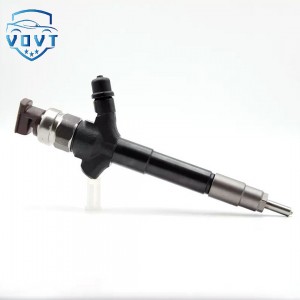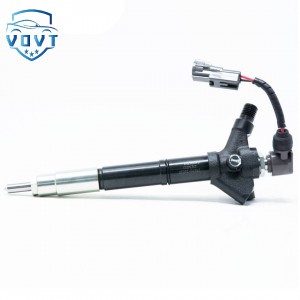High Quality Auto Parts Diesel Fuel Injector 095000-0176 Fuel Injector Engine Parts
Products Description
| Reference. Codes | 095000-0176 |
| Application | / |
| MOQ | 4PCS |
| Certification | ISO9001 |
| Place of Origin | China |
| Packaging | Neutral packing |
| Quality Control | 100% tested before shipment |
| Lead time | 7~15 working days |
| Payment | T/T, L/C, Western Union, Money Gram, Paypal, Ali pay, Wechat |
Feasibility and Precision Control in the Manufacturing of Complex Flow Channels for Fuel Injectors
Abstract
The rapid evolution of high-pressure fuel injection systems has led to increasingly complex internal geometries within fuel injectors, designed to enhance atomization quality, combustion efficiency, and emission control. However, these intricate micro-scale flow channels present significant challenges in manufacturing accuracy, surface quality, and repeatability. This study explores the feasibility of advanced manufacturing technologies—including 3D printing, micro-EDM, and laser micromachining—for the fabrication of complex fuel injector flow passages, and investigates strategies for precision control and dimensional optimization.
Through a combination of computational modeling and experimental validation, the study evaluates the geometric accuracy, surface integrity, and hydraulic performance of fabricated samples. Results indicate that additive manufacturing offers high design flexibility for producing non-linear and multi-branch flow channels, though surface roughness and dimensional deviation remain key obstacles. Micro-EDM and laser-based hybrid machining, when applied as post-processing methods, effectively improve surface smoothness (Ra < 1.5 μm) and maintain tolerance within ±3 μm, ensuring consistent flow characteristics.
Flow simulations based on CFD (Computational Fluid Dynamics) reveal that even minor deviations in channel diameter or curvature can cause noticeable fluctuations in velocity distribution and pressure drop, directly impacting fuel spray uniformity. The integration of real-time monitoring and feedback-controlled precision adjustment during the manufacturing process significantly reduces these variations and enhances repeatability.
The research concludes that advanced manufacturing, particularly metal additive manufacturing combined with precision finishing, is technically feasible for producing complex injector flow channels. However, achieving mass-production-level precision and stability still requires improvements in process control, material properties, and predictive modeling of thermal deformation. Future work will focus on closed-loop precision control systems and intelligent optimization algorithms to further enhance accuracy and reliability in injector manufacturing.























